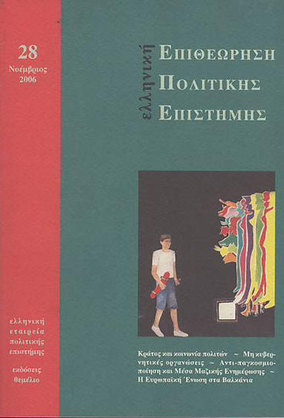Η κρυφή γοητεία της ιδεολογίας : Αντι-θεωρητισμός και εκλεκτισμός στη μελέτη του εργατικού κινήματος
Part of : Ελληνική Επιθεώρηση Πολιτικής Επιστήμης ; No.8, 1996, pages 191-217
Issue:
Pages:
191-217
Parallel Title:
The discreet charm of ideology : a-theoreticm and electicism in the study of the Greek labor movement
Section Title:
Αντιβολές
Author:
Abstract:
This article sets out to accomplish two interrelated tasks. First, it seeks to expose and rebut the recent assault of a-theoretical empiricism waged against the employment of abstract concepts for theory-building in the social sciences. The main argument put forward is that this trend’s criticism against macro-theory’s inherently low capacity to predict and explain specific outcomes and single events is, for the most part, theoretically misinformed. For, the purposes of abstract-general theories is of course that too, but only secondarily and peripherally so. Instead, the fundamental explaining that they perform is of the broad-tendencial kind, preoccupied with rendering the immanent logic and dynamic proclivities of long-term processes. Moreover, by bounding the empirical universe, general theories also direct us in an ordinate manner (from the abstract to the proximate) to raise the appropriate questions, to be taken up by intermediate and proximate-level theorizing. Failing to recognize this (often for normative/ideological reasons), has resulted in the unpleasant state of affairs of having the mass production of intermediate and low-level theories and propositions, albeit not purporting to complement but to replace or, even worse, displace general theories. The result has been a distressing loss of theoretical communicability and cumulativeness, paired with a growing sense of relativism, if not agnosticism, where anything goes and at the end of the day one is unable to key his/her “proximate” findings into larger frameworks, or come up with a theoretical ordering of propositions and variables. In this connection, it is cautioned that this revolt against theoretical constraints may in fact represent an assault against theorizing in toto, hence it must be resisted. The second part of the article deals with the problem of eclecticism in the study of the interwar Greek working-class formation as exemplified by the work of one particular Greek author, who claims that no such process ever occurred. The main thesis put forward is that this conclusion relies on the systematic, and apparently normative, shunning of pertinent empirical evidence, plus a conscious, and hardly noble, effort to stand some of the views I submitted in a previous article on their head. In particular, whereas the thesis defended in that article was that Greek workingclass formation proceeded despite the absence of large-scale industry and a numerically large industrial proletariat, the polemic implies the opposite, namely that the Greek productive structures resembled those of the advanced countries of the West. An effort is also made to expose the deeply ideological character of the underlying view that is germane to that polemic; namely, that Greece was a “traditional society”.
Subject:
Subject (LC):
Keywords:
εργατικό κίνημα, Ελλάς




